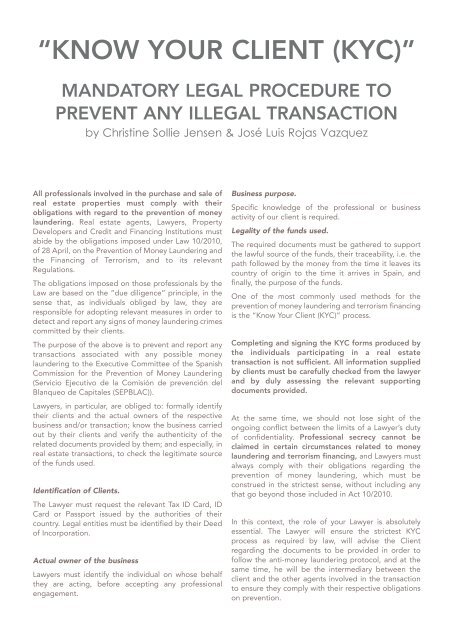Domus Venari Spring Summer 24
Create successful ePaper yourself
Turn your PDF publications into a flip-book with our unique Google optimized e-Paper software.
PAG 14 A 82 ADS 59.qxp_Maquetación 1 19/3/<strong>24</strong> 13:31 Página 76<br />
“KNOW YOUR CLIENT (KYC)”<br />
MANDATORY LEGAL PROCEDURE TO<br />
PREVENT ANY ILLEGAL TRANSACTION<br />
by Christine Sollie Jensen & José Luis Rojas Vazquez<br />
All professionals involved in the purchase and sale of<br />
real estate properties must comply with their<br />
obligations with regard to the prevention of money<br />
laundering. Real estate agents, Lawyers, Property<br />
Developers and Credit and Financing Institutions must<br />
abide by the obligations imposed under Law 10/2010,<br />
of 28 April, on the Prevention of Money Laundering and<br />
the Financing of Terrorism, and to its relevant<br />
Regulations.<br />
The obligations imposed on those professionals by the<br />
Law are based on the “due diligence” principle, in the<br />
sense that, as individuals obliged by law, they are<br />
responsible for adopting relevant measures in order to<br />
detect and report any signs of money laundering crimes<br />
committed by their clients.<br />
The purpose of the above is to prevent and report any<br />
transactions associated with any possible money<br />
laundering to the Executive Committee of the Spanish<br />
Commission for the Prevention of Money Laundering<br />
(Servicio Ejecutivo de la Comisión de prevención del<br />
Blanqueo de Capitales (SEPBLAC)).<br />
Lawyers, in particular, are obliged to: formally identify<br />
their clients and the actual owners of the respective<br />
business and/or transaction; know the business carried<br />
out by their clients and verify the authenticity of the<br />
related documents provided by them; and especially, in<br />
real estate transactions, to check the legitimate source<br />
of the funds used.<br />
Identification of Clients.<br />
The Lawyer must request the relevant Tax ID Card, ID<br />
Card or Passport issued by the authorities of their<br />
country. Legal entities must be identified by their Deed<br />
of Incorporation.<br />
Actual owner of the business<br />
Lawyers must identify the individual on whose behalf<br />
they are acting, before accepting any professional<br />
engagement.<br />
Business purpose.<br />
Specific knowledge of the professional or business<br />
activity of our client is required.<br />
Legality of the funds used.<br />
The required documents must be gathered to support<br />
the lawful source of the funds, their traceability, i.e. the<br />
path followed by the money from the time it leaves its<br />
country of origin to the time it arrives in Spain, and<br />
finally, the purpose of the funds.<br />
One of the most commonly used methods for the<br />
prevention of money laundering and terrorism financing<br />
is the “Know Your Client (KYC)” process.<br />
Completing and signing the KYC forms produced by<br />
the individuals participating in a real estate<br />
transaction is not sufficient. All information supplied<br />
by clients must be carefully checked from the lawyer<br />
and by duly assessing the relevant supporting<br />
documents provided.<br />
At the same time, we should not lose sight of the<br />
ongoing conflict between the limits of a Lawyer’s duty<br />
of confidentiality. Professional secrecy cannot be<br />
claimed in certain circumstances related to money<br />
laundering and terrorism financing, and Lawyers must<br />
always comply with their obligations regarding the<br />
prevention of money laundering, which must be<br />
construed in the strictest sense, without including any<br />
that go beyond those included in Act 10/2010.<br />
In this context, the role of your Lawyer is absolutely<br />
essential. The Lawyer will ensure the strictest KYC<br />
process as required by law, will advise the Client<br />
regarding the documents to be provided in order to<br />
follow the anti-money laundering protocol, and at the<br />
same time, he will be the intermediary between the<br />
client and the other agents involved in the transaction<br />
to ensure they comply with their respective obligations<br />
on prevention.















